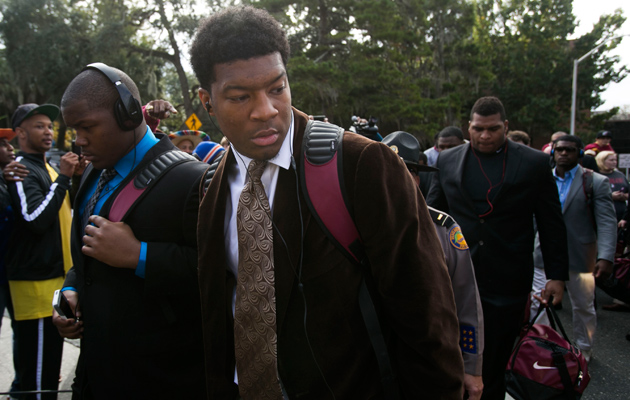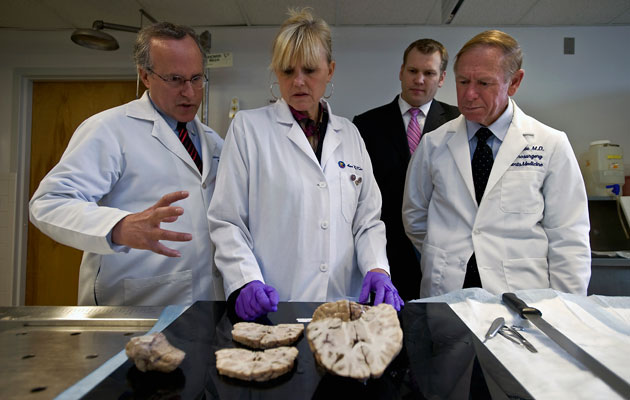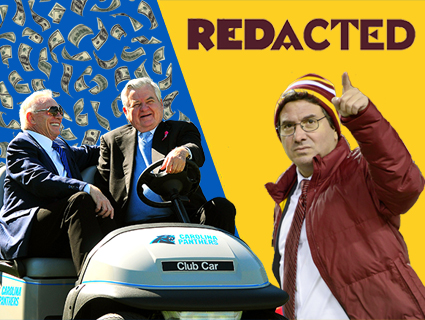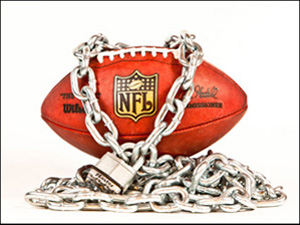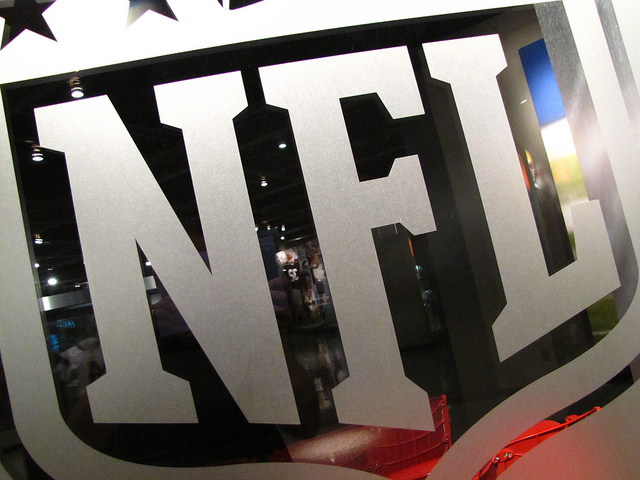
<a href="http://www.flickr.com/photos/pleeker/4875018588/sizes/z/in/photolist-8qMKbC-8qMDod-bnzwt9-a82wx3-q9NtN-dV3SF1-6NrHms-8qJuiz-8qMyDW-8qMzbb-8qJu1H-7hfrTt-bq5yyT-9E7KX5-gfrUxC-asLnAb-asLmhd-asCZ8d-4JgGzW-4JgHA9-4JgHmU-4Jct84-8WUG7Z-5Cw4Vc-bgJn9M-8v8BuJ-8uRJbQ-8uNHoV-8uNzbR-8uRkK1-8uNprg-8uRyub-8uRptw-8Sk7Pe-dTyQ3K-5xiRqh-j26rB-9E7S9o-9E8os5-9E51PH-9E523z-9E85Cs-9E8ggy-9E7JTW-9E84wd-9E8f8s-9E4RA6-9E7WNN-9E5t62-9E7DUj-9E7LVs/">Matt McGee</a>/Flickr
Times are good for the National Football League. Viewership is up. For the 47th year in a row, Harris Interactive named pro football the most popular sport in America. And with overall revenues north of $9 billion, the NFL is the most lucrative sports league on the planet.
That’s not enough for NFL Commissioner Roger Goodell. He wants to nearly triple the league’s revenues to $25 billion by 2027—a mind-bogglingly large number. But here’s an even more shocking fact: The NFL pays nothing in taxes on all those revenues. Not a nickel. And now the anti-corruption organization Rootstrikers wants to put an end to the NFL’s free ride.
Over the weekend, Rootstrikers blasted out an email urging people to sign a petition in support of Sen. Tom Coburn’s (R-Okla.) PRO Sports Act, which would ban big sports leagues from receiving tax-exempt status. “You know the NFL as the National Football League,” says the Rootstrikers email. “But the IRS knows them better as the Nonprofit Football League—that’s because the NFL has not paid any taxes since 1966 and average Americans are left paying higher taxes to make up for that lost revenue. Senator [Tom] Coburn is trying to change that, and we support his endeavor.” Coburn’s bill would ban pro sports leagues with more than $10 million in revenue from receiving tax-exempt status.
So, you might ask, how did the NFL score such a lucky deal in the first place? It’s a classic tale of political influence and lobbying ingenious, as Gregg Easterbrook explains in an excerpt of his book The King of Sports: Football’s Impact on America, published in the Atlantic:
The 1961 Sports Broadcasting Act was the first piece of gift-wrapped legislation, granting the leagues legal permission to conduct television-broadcast negotiations in a way that otherwise would have been price collusion. Then, in 1966, Congress enacted Public Law 89?800, which broadened the limited antitrust exemptions of the 1961 law. Essentially, the 1966 statute said that if the two pro-football leagues of that era merged—they would complete such a merger four years later, forming the current NFL—the new entity could act as a monopoly regarding television rights. Apple or ExxonMobil can only dream of legal permission to function as a monopoly: the 1966 law was effectively a license for NFL owners to print money. Yet this sweetheart deal was offered to the NFL in exchange only for its promise not to schedule games on Friday nights or Saturdays in autumn, when many high schools and colleges play football.
Public Law 89-800 had no name—unlike, say, the catchy USA Patriot Act or the Patient Protection and Affordable Care Act. Congress presumably wanted the bill to be low-profile, given that its effect was to increase NFL owners’ wealth at the expense of average people.
While Public Law 89-800 was being negotiated with congressional leaders, NFL lobbyists tossed in the sort of obscure provision that is the essence of the lobbyist’s art. The phrase or professional football leagues was added to Section 501(c)6 of 26 U.S.C., the Internal Revenue Code. Previously, a sentence in Section 501(c)6 had granted not-for-profit status to “business leagues, chambers of commerce, real-estate boards, or boards of trade.” Since 1966, the code has read: “business leagues, chambers of commerce, real-estate boards, boards of trade, or professional football leagues.”
The insertion of professional football leagues into the definition of not-for-profit organizations was a transparent sellout of public interest. This decision has saved the NFL uncounted millions in tax obligations, which means that ordinary people must pay higher taxes, public spending must decline, or the national debt must increase to make up for the shortfall. Nonprofit status applies to the NFL’s headquarters, which administers the league and its all-important television contracts. Individual teams are for-profit and presumably pay income taxes—though because all except the Green Bay Packers are privately held and do not disclose their finances, it’s impossible to be sure.
Since winning that insanely lucrative add-in, the NFL has spent lavishly to protect it and keep lawmakers happy. The organization has shelled out $12.7 million on lobbying since 1998—more than any other professional sports league—and given $2 million in campaign donations since 1992, according to the Center for Responsive Politics.
Those calling for the NFL to be stripped of its tax-exempt status point out that its leadership is making Wall Street money. In 2011, the NFL paid its five highest-ranking executives almost $60 million. Goodell alone pocketed $29 million. This largesse comes largely on the backs of taxpayers in cities that have pro football teams. As Easterbrook notes, “Judith Grant Long, a Harvard University professor of urban planning, calculates that league-wide, 70 percent of the capital cost of NFL stadiums has been provided by taxpayers, not NFL owners. Many cities, counties, and states also pay the stadiums’ ongoing costs, by providing power, sewer services, other infrastructure, and stadium improvements.” In other words, the NFL isn’t just ducking taxes; it’s fleecing working people who do pay their taxes.
To be clear, as the NFL points out, much of pro football’s billions in revenue ultimately get funneled to the league’s 32 teams, which do pay taxes. Yet the league office’s 2011 revenues still add up to a staggering $255 million, while the league spent some $332 million that year.
Which brings us back to the Rootstrikers petition in support of Coburn’s PRO Sports Act. The bill, which has been stuck in committee since September, could use all the help it can get. So as you settle onto the couch next Sunday for a full day of gridiron action, don’t be fooled by the NFL’s manly, to-the-victor-go-the-spoils ethos. The league is one of the biggest welfare queens around.

